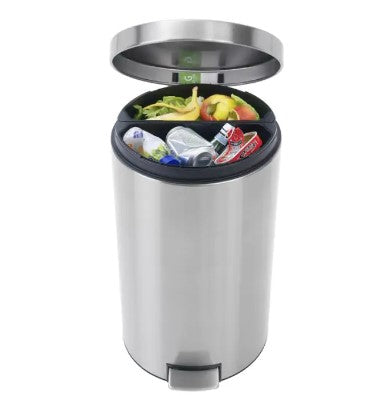OR
Express Checkout
We guarantee to have the lowest price! Find the same bin for a cheaper price and we will beat it!

In the UK, we throw away 9.5 million tonnes of food waste each year. That’s despite over 8 million people living in food poverty, and many more across the globe. When food goes to waste, it has economic, environmental, and moral consequences. So what happens to household food waste? Read our guide.
While more councils now provide food waste collections, millions of tonnes of food waste still ends up in landfill. As it rots, it gives off methane, a greenhouse gas more potent that carbon dioxide. Methane traps heat in the atmosphere and this contributes to global warming. Some councils send food waste to the incinerator. However, because of food’s high water content, it takes a lot of energy to burn it so it’s inefficient. A far better option is recycling food waste. So how is it recycled?
Food waste is mixed with garden waste, then it is shredded and composted in an enclosed tank for up to 4 weeks. While in the tank, it’s subjected to temperature of up to 70°C. The high temperature breaks down the waste and kills off any harmful pathogens. The composted material is left outside and turned every month or so before being used as a nutrient rich feed for soil.
Food waste is fed into a tank where microorganisms break it down in the absence of oxygen. As the waste breaks down, it gives off methane. However, unlike on landfill, methane doesn’t just escape into the atmosphere. It’s collected and converted to biogas which is used to produce electricity, heat, or biofuel for vehicles. A by-product of the process is also used as an agricultural fertiliser.
If your council hasn’t provided you with a food waste caddy, invest in one. A caddy will help you keep your food waste separate from the rest of your waste. We recommend lining your caddy with a liner of newspaper so things don’t get too messy or smelly.
Feeling a twinge of guilt about how much food waste you throw away? Here are some top tips on how you can reduce your food waste at home.
This will help you work out exactly what you need to buy. It does take a little time, but it does prevent unnecessary buys.
This not only reduces waste but it also helps save time. Cook extra portions of some family favourites that you can pull out of the freezer when you’re in a pinch. Read our article about getting the most out of your freezer to cut waste.
Recycle your food waste and get some nutrient-rich mulch for your garden. What’s not to love?